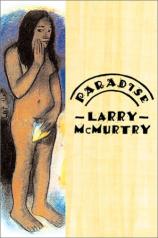Paradise
Review
Paradise
In
his new memoir, PARADISE, Pulitzer Prize-winner, screenwriter and
bookstore-owner Larry McMurtry trades the highways and byways of
the American West for the blue highway of the Pacific Ocean.
PARADISE, the third of his memoirs, contrasts the marriage and
hard-scrabble life of his parents in West Texas to life in the lush
"paradise" of Tahiti as well as pointing out the similarities
between Native American reservation life and that of these
indigenous people so many thousands of miles away. McMurtry's prose
is reflective and full of emotion; while he is floating from island
to island adrift in a faraway sea, his mother is also "at sea," at
home in Texas, dying slowly and painfully. This latest book of
McMurtry's is, to say the least, quite different from his LONESOME
DOVE saga.
The cover of the memoir is sly and deceptive; my family was certain
I was reading a "dirty" book. A full length, bold and vibrant
Gauguin commands the reader's attention. This painting is of a
beautiful and quite nude young Tahitian woman who appears startled,
as if suddenly realizing she is being watched, and tries to cover
her nakedness with a handkerchief. As PARADISE unfolds, McMurtry
goes into great detail about the painting, its subject, and the
artist. For instance, the reader learns that Gauguin left his
Danish wife and their five children before going to Tahiti to
paint. The subject of the painting? Gauguin's 13-year-old mistress
Teha'amana. Understanding the painting and the artist are central
to understanding McMurtry and his peregrinations.
While the jacket copy states that the book is both "an inviting
travel book and an insightful reflection on his parents'
marriage…," I would not term it a travel book at all. It is
more a journal of a long, sometimes tedious, voyage on a freighter.
McMurtry has signed aboard this floating tin can in hopes of
glimpsing the "real" life in the islands --- as have a slew of
European tourists, making any forays into the underside of native
life nearly impossible. Much of the book takes place while the
freighter is at sea, with McMurtry at his laconically hilarious
best, describing the tensions between the crew of the ship and
their white, Western passengers as well as the minutia of these
tourists' daily habits. The shipboard routine is broken only by
occasional stops at remote islands for the crew to load and unload
staples and for the tourists on board to stock up on native crafts.
McMurtry's insights into his parents' dysfunctional marriage,
however, keep the reader's attention. Early on McMurtry recounts a
well-intentioned surprise gone awry. He had planned a special event
for his parents 42nd wedding anniversary, buying them airplane
tickets from Texas to visit him in Washington, DC. It was one of
only three trips the couple took in all their years together. The
night before the flight, McMurtry's parents quarreled over an
inconsequential detail, and although they did not cancel the trip,
the day in Washington was full of fuming, silent treatments,
passive aggressive hostility and was generally awful for anyone
involved. The author reveals many pages later that this was only a
culmination of many conflicts between his parents. His father and
mother once made an attempt to address their sham of a marriage,
making an appointment with a marriage counselor, but the
appointment was canceled due to the fear that people in their tiny
town might talk.
PARADISE is a quick read (only about 160 pages) and yet one that
raises questions in every reader about the reality of his/her
parents' marriages and lives. What is PARADISE anyway? Where is it?
When will we reach eternal happiness? Perhaps none of us realize
that we may be already living there.
Reviewed by Carolyn Branch Leonard on January 22, 2011
Paradise
- Publication Date: June 7, 2001
- Genres: Nonfiction
- Hardcover: 160 pages
- Publisher: Simon & Schuster
- ISBN-10: 0743215656
- ISBN-13: 9780743215657





